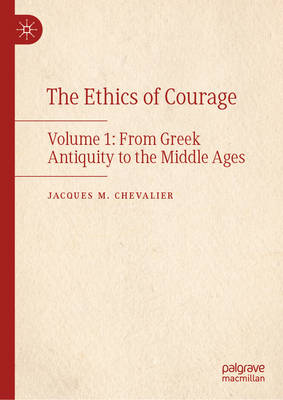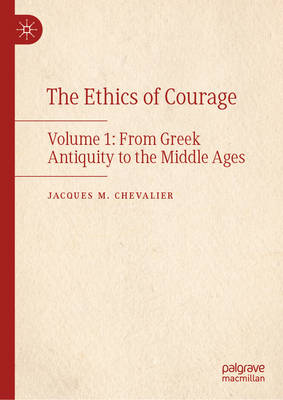
- Retrait gratuit dans votre magasin Club
- 7.000.000 titres dans notre catalogue
- Payer en toute sécurité
- Toujours un magasin près de chez vous
- Retrait gratuit dans votre magasin Club
- 7.000.000 titres dans notre catalogue
- Payer en toute sécurité
- Toujours un magasin près de chez vous
The Ethics of Courage
Volume 1: From Greek Antiquity to the Middle Ages
Jacques M ChevalierDescription
This two-volume work examines far-reaching debates on the concept of courage from Greek antiquity to the Christian and mediaeval periods, as well as the modern era. Volume 1 begins with Homeric poetry and the politics of fearless demi-gods thriving on war. The tales of lion-hearted Heracles, Achilles, and Ulysses, and their tragic fall at the hands of fate, eventually give way to classical views of courage based on competing theories of rational wisdom and truth. Fears of the enemy and anxieties about suffering and death are addressed through the lenses and teachings of medicine, geography, military history, moral philosophy, and metaphysics.
For early Christian thinkers, the ethics of fear, fate, and fealty to the Almighty supplant the voice of reason and the wisdom of virtue. Much of Christian doctrine's history is a long journey towards bridging the gap between Greek philosophy and devotion to God and spirits in heaven. Some Church Fathers attempt to dispel the fear of suffering through a joyful craving for martyrdom and the eternal blessings that follow. Others show openness to one or more of the following principles: the abstractions of moral philosophy, the metaphysics of Gnostic enlightenment, the gift of free will and intentionality, the growth of church authority and hegemony, and the intrinsic worth of life on Earth. Augustine, Ambrose, Cassian, and Chrysostom play a central role in revisiting the foundations of Christian fortitude along some or all of these lines. They lay the groundwork for the scholastic adaptations of faith-based rationalism proposed by Peter Lombard, Philip the Chancellor, Albert the Great, and Thomas of Aquinas.
The mediaeval period ends with church dissidents and Protestant Reform leaders condemning Rome's corruption and calling for a return to early Christian faith and the courage of godly fear, submission, suffering, and fate.Spécifications
Parties prenantes
- Auteur(s) :
- Editeur:
Contenu
- Nombre de pages :
- 378
- Langue:
- Anglais
Caractéristiques
- EAN:
- 9783031327384
- Date de parution :
- 21-11-23
- Format:
- Livre relié
- Format numérique:
- Genaaid
- Dimensions :
- 148 mm x 210 mm
- Poids :
- 612 g







